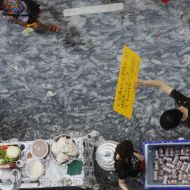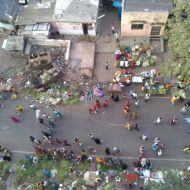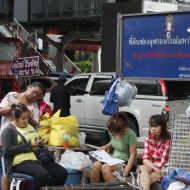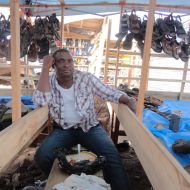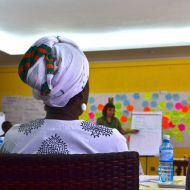The Virtues of Corruption
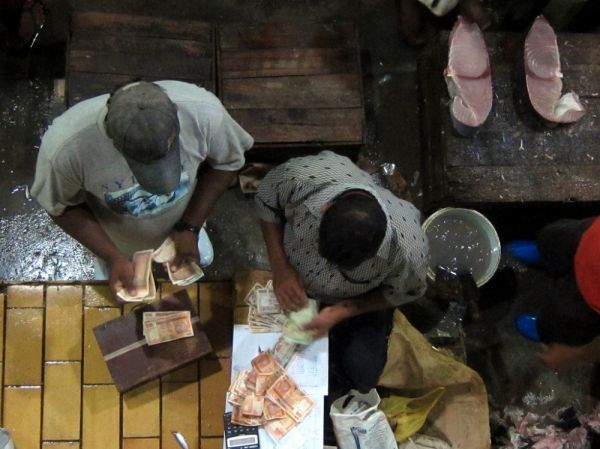
The great German-American political theorist Carl J. Friedrich once suggested that corruption, like arsenic, could be an aid to civic health in trace amounts. Photo credit: Indi Samarajiva via Flickr
I have been arguing in my new book, If Mayors Ruled the World, that in an interdependent world where sovereign nation-states often seem dysfunctional when it comes to international cooperation, cities may have a new and influential role to play. That, if indeed, mayors and those they represent were in charge, we might actually find ways to resolve democratically some of our global problems. It is hard to imagine we can go on confronting a 21st century world of interdependent challenges in crime, environment, security, immigration, markets and war while we are deploying 18th century nation-state solutions that have long since ceased to work.
The cities perspective changes our outlook on many things. Democracy can be more participatory, politicians more engaged, and politics more focused on pragmatic solutions than divisive ideology. After all, mayors are homeboys and the equals of fellow citizens and neighbors.
Yet cities have serious problems too, and poverty and inequality are among them. The cities’ lens also refracts how we look at such problems. Richard Florida, for example, has argued that creativity and entrepreneurship are central to the urban identity and give cities a way to confront inequality. Here I will make another, perhaps more provocative argument: That in the perspective of cities, even corruption may have a different aspect. In dire circumstances in developing world megacities whose mega-slums obstruct the path forward, corruption may even offer a perverse kind of opportunity to those otherwise without hope.
The point of this argument is not to embrace corruption or even tolerate it, for corruption is ultimately not only ruinous to democracy, but particularly corrosive to the prospects of poor people. They are its first victims. Nonetheless, they are also sometimes its beneficiaries in ways that help explicate the informal sides of city governance and the odd sympathy for corruption we can sometimes find in developing-world narratives.
Hear Dr. Barber discuss these ideas and more on WNYC’s Brian Lehrer Show.
The reality is that immigrants and newcomers may benefit from inefficiency and even mild workplace corruption, as the waves of immigrants a century ago in New York and Chicago – and newcomers flocking to Sao Paulo and Mumbai today – will attest. Corruption, and even crime, undermines community and impedes democracy in the long term, but in the short run it can act as an equalizer, a kind of crude fast-track to proximate equality. This no more justifies corruption than child labor can be justified by Katherine Boo’s vivid portrait of Mumbai children earning subsistence earnings from sorting and selling the garbage in which they quite literally live. But as Boo writes, “In the West, and among some in the Indian elite, this word, corruption, has purely negative connotations: it was seen as blocking India’s modern, global ambitions. But for the poor of a country where corruption thieved a great deal of opportunity, corruption was one of the genuine opportunities that remained.”
To take equality and justice seriously then, we must always ask the question: Corruption by whom? Crime against whom? In whose interests? Crime is in many instances a consequence of greed, selfishness and psychic disorders, but it can also reflect a twisted society in which criminality appears as the only way out for certain people on the margins. In the setting of a fair, equitable society in which equal opportunity belongs to all, both crime and corruption are unequivocal evils. But in a rigid, hierarchical society in which exploitation and unfairness are built into a system, where upward mobility is a dubious proposition and bigotry and segregation close many of the conventional roads to integration and assimilation, those same vices become compensatory opportunities — not “goods,” but acceptable tactics in the struggle against systemic injustice. (The great German-American political theorist Carl J. Friedrich, who helped write the post-war German constitution, once suggested that corruption, like arsenic, though deadly, could actually be an aid to civic health in trace amounts.)

Informal workers might be forgiven for seeing corruption as a leveling down that lets them in the game. Photo credit: Carrie Kellenberger
In Brecht’s towering play Mother Courage, one of her sons responds to a charge that he is exploiting army corruption by blurting out, “Thank God they’re corrupt. Corruption is the equivalent of God’s mercy. As long a someone’s on the take, you can buy a shorter sentence, so even the innocent have a shot at justice.” Katherine Boo shows how poor residents of Mumbai live Brecht’s cynical idealism. “For some people,” she once said in a radio interview, “corruption is one of the few opportunities that remain.” In Mexico City and Kabul, where police corruption directly endangers local residents, Boo’s lessons drawn from the Anawati slum near the Mumbai airport seem less convincing. Yet even in such cities (and Mumbai also suffers from police corruption in its approach to rape, for example), corruption is more a testament to the failures of democracy in other domains — the persistence of segregation, the ignoring of poverty, the neglect of injustice. Those afflicted by the latter evils might be forgiven for seeing in the former some twisted form of good, of democracy itself understood as a leveling down that lets them in the game, however much the “rules” (calculated to disadvantage them) forbid it.
Ideally, of course, reforming urban inequality in jobs and other domains calls for systemic if not revolutionary change. Yet as this discussion suggests, partial and contextualized solutions that work under the constrained circumstances of an unfair global society look like a better bet. But the denizen of cities are not currently positioned to affect those global problems, in part because urbanization is less voluntary in the developing world than in the West.
While historically, the West’s big cities pulled people off the land and into the city with a siren song of economic opportunity and the seductive excitement of fresh lives of possibility, much of the rapid population growth in the developing world’s megacities has been the result of people pushed off the land by unemployment and the kind of global market competition local agriculture can’t combat. It is the negative profile of the rural economy rather than the positive profile of the city that sends people scrambling to the metropolis. Yet jobs are low-paying in an unstable and lackluster informal urban economy, where their best hope is to find a ghetto squat and a position that allows them to scrape by, and one day perhaps move from the informal to the formal urban economy, and from squatting to owning a home. This is not simply naiveté. As one of Boo’s subjects tells her, “a decent life was the train that hadn’t hit you, the slumlord you hadn’t offended, the malaria you hadn’t caught.”
Still, in Mumbai and Lagos and Jakarta, having expectations still makes sense, which is one reason the poor make war on one another; why in cities like Mumbai, racist Hindu parties such as Shiv Sena campaign to “purge Mumbai of migrants from India’s poor northern states,” above all, Muslims. There is something to fight over. These pale but seductive opportunities have led to astonishing growth in third-world megacities in the absence of either mobility or genuine hope. In China, for example, construction-worker colonies drawn from inland village China (where more than two-thirds of the country’s population still lives) constitute a new and troubling form of transient urban ghetto, one without roots in any traditional neighborhood and existing only as a temporarily-employed male enclave possessing no discernible “rights to the city.”
Poverty, injustice and segregation in every relevant urban sector, in both the first and developing worlds, remain major obstacles to urban equality and hence to the role of cities in nurturing democratic global governance. Too many of the urban advantages we celebrate, from creativity and culture to trade and diversity, have consequences that accrue to the middle and upper classes at the expense of the poor. What should be common city assets become zero-sum games in which one (rich) man’s redevelopment plan spells another (poor) man’s loss of center-city housing; in which a wealthy woman’s riverside playground is housed in former manufacturing warehouses from which poor women’s sewing jobs have fled. Too often then in this setting, city corruption is defined in ways that exempt white-collar criminality (bank redlining to enforce segregation, for example, or bundling and reselling mortgage debt to distant investors insulated from responsibility to borrowers), even as they highlight activities of the poor that, while illegal, might ease their plight, if only temporarily. Inequality comes in many forms, and – appropriately, in this era of interdependence — these forms are intimately linked. Attack educational discrimination and it reappears as housing discrimination. Increase the number of working-class jobs and inadequate transportation blocks the poor from getting to them.
With the problems so ingrained and their origin at least in part associated with national and global forces outside the city, remediation is extraordinarily difficult. Only with innovation and imagination is inequality likely to be touched. Only if we are willing to look at the informal as well as the formal economy, and ignore the common wisdom about corruption and squatting and hidden capital, are we likely to find some partial answers to the burdens under which even the most progressive and prosperous cities labor. Only if the underlying and intransigent realities of urban segregation in all its forms can be addressed are we likely to instigate mitigation successfully. It is in this context that we have to re-examine corruption and ask whether a blanket condemnation is possible; whether vice is not relative — always undesirable, but understandable sometimes in a context of the greater evil of a wholly corrupt political and economic system.
Benjamin R. Barber is a Senior Research Scholar at The Center on Philanthropy and Civil Society of The Graduate Center, The City University of New York, the President and Founder of the Interdependence Movement, and Walt Whitman Professor of Political Science Emeritus, Rutgers University. His 17 books include the classic Strong Democracy, the international best-seller Jihad vs. McWorld, and most recently Consumed: How Markets Corrupt Children, Infantilize Adults, and Swallow Citizens Whole. His upcoming book, If Mayors Ruled the World, will be published by Yale University Press this year. Visit www.benjaminbarber.org for more information.

